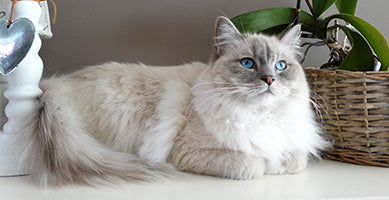Jessica W. Kelvin - Mar.05.2024
Why Do Cats Eat Grass?
7 Insights into Feline Behavior

Green Bites: Promoting Feline Wellness Through Nature's Offerings
Cats, those enigmatic and independent creatures that grace our homes with their presence, have a variety of behaviors that often leave their human companions puzzled. One such behavior is eating grass. While it may seem odd at first glance, there's a wealth of reasons behind why cats engage in this seemingly counterintuitive act. This article delves into the science and psychology behind why cats eat grass, offering insights into how this behavior benefits them, potential risks to watch out for, and tips for safely introducing grass into your cat's environment.
The Science Behind Cats Eating Grass
Historical Perspectives
The practice of cats eating grass dates back centuries, observed both in domesticated and wild felines. Historically, it's believed this behavior was essential for survival, offering nutritional and health benefits not readily found in their primary diet of prey.
Nutritional Benefits
Cats eating grass might seem counterintuitive at first, given their carnivorous nature. However, this behavior is rooted in a complex interplay of nutritional needs and instinctual habits. Grass contains folic acid, a vitamin essential for oxygen transportation in the bloodstream and overall health. While the primary diet of a cat, rich in meats, fulfills their protein and fat requirements, grass offers a source of micronutrients not commonly found in their standard diet.
Furthermore, grass provides a source of fiber, crucial for aiding digestion. In the wild, cats consume their prey whole, including the fibrous contents of their prey's stomach. Domestic cats, lacking this natural source of fiber, turn to grass as an alternative. Fiber aids in the movement of food through the digestive tract, helping prevent constipation and facilitating the expulsion of hairballs. This natural remedy helps maintain a healthy digestive system, reducing the risk of blockages and discomfort.
Cats instinctively seek out grass to supplement their diet, addressing a gap not filled by commercial cat foods. Providing your cat with access to safe, non-toxic grass varieties can help satisfy this nutritional instinct, promoting overall well-being and digestive health.
Psychological Reasons
The act of eating grass can also be seen as a psychological outlet for cats. In the confines of a home, cats may not have access to the wide range of activities available in the wild. Eating grass offers a semblance of natural behavior, providing mental stimulation and reducing boredom. This activity can be particularly beneficial for indoor cats, who have fewer opportunities to engage with the natural world.
Stress relief is another significant aspect of this behavior. The act of chewing on grass can have a soothing effect, helping to alleviate anxiety and stress. It's a form of environmental enrichment that caters to their natural inclinations, promoting a sense of calm and contentment.
Understanding the psychological benefits of grass eating underscores the importance of providing cats with activities that fulfill their instinctual needs. Growing cat-safe grass indoors or providing access to a secure outdoor area where they can graze can enhance their mental well-being and quality of life.

Showing making procedure is a good way to guarantee product quality
Stress Relief
Eating grass can also serve as a form of stress relief for cats, providing a calming activity that distracts from anxiety or boredom.


Get customer attention by clean visual and video
Instinctual Actions
Grass eating is an instinctual behavior that may stem from a cat's need to seek out alternative food sources or to induce vomiting to clear their stomachs of indigestible materials.
Health Benefits
Beyond the nutritional and psychological advantages, eating grass has potential health benefits for cats. One of the most cited reasons for this behavior is its role as a natural emetic. When cats consume grass, the indigestible fibers may induce vomiting, allowing them to expel indigestible parts of their diet, such as fur or bones. This self-induced vomiting can prevent the formation of hairballs and clear their digestive tract of any non-food items ingested during grooming.
Additionally, the consumption of grass may aid in the control of intestinal parasites. The mechanical action of grass fibers moving through the digestive tract can help clear worms and other parasites, although this should not replace regular veterinary care and deworming treatments.
Offering your cat access to grass, coupled with regular veterinary check-ups, can contribute to their physical health, acting as a supplementary measure to their overall healthcare regimen.
Article credit: Heidi Cohen (https://heidicohen.com/use-blog-to-sell/)
Digestive Aid
Grass acts as a natural laxative, helping cats pass hairballs or other indigestible items through their digestive tract more easily.
Elimination of Parasites
It's also theorized that grass eating may help cats eliminate intestinal parasites, although this benefit is more anecdotal than scientifically proven.
Potential Risks and Considerations
Toxic Plants
Not all plants are safe for cats. It's crucial to distinguish between harmless grass and toxic plants that can pose serious health risks.
Pesticides and Chemicals
Grass treated with pesticides or other chemicals can be harmful to cats. Providing a safe, untreated grass source is essential for their health.
How to Safely Introduce Grass to Your Cat
Suitable Types of Grass
Certain types of grass are more beneficial and safer for cats, including wheatgrass, which is often sold as "cat grass."
Growing Your Own Cat
Grass
For the safety and health of your cat, consider growing your own cat grass at home. It's a simple and effective way to ensure they're getting a safe product.
Alternative Behaviors and Solutions
Dietary Supplements
If your cat shows an excessive interest in eating grass, it might indicate a dietary deficiency. Consult with a veterinarian about supplementing your cat's diet.
Behavioral Enrichment
Providing toys, climbing structures, and engaging activities can reduce your cat's inclination to eat grass by offering alternative forms of stimulation.
Why Do Cats Eat Grass?
Exploring the curiosity behind this behavior reveals a complex blend of nutritional, psychological, and instinctual factors. Understanding these can help cat owners provide better care and enrichment for their feline friends.
Owner Experiences and Advice
Personal Anecdotes
Many cat owners have observed their pets eating grass and have noted the benefits or concerns that came with it. Sharing these experiences can offer valuable insights for other pet owners.
Expert Recommendations
Veterinarians and animal behaviorists can provide professional advice on managing grass-eating behavior, ensuring it remains a safe and positive experience for your cat.
Safe types of grass for cats include wheatgrass, oat grass, and barley grass. These grasses are non-toxic and can provide beneficial fiber to your cat's diet. It's crucial to ensure the grass is grown in a pesticide-free environment to prevent any potential harm to your pet. Many pet stores sell kits for growing cat grass at home, which can be a fun and safe way to provide your cat with grass.
Say it at the end
Understanding why cats eat grass sheds light on their complex behaviors and the natural instincts that drive them. By providing safe, suitable grass and paying attention to the underlying reasons for this behavior, cat owners can ensure their feline companions lead happy, healthy lives.












